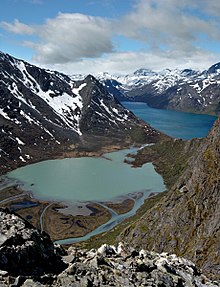Jotunheimen
Jotunheimen (English: The Home of the Giants) is a mountainous area of roughly 3,500 km²[citation needed] in Southern Norway and is part of the long Scandinavian Mountain range. The 29 highest mountains in Norway are all in Jotunheimen, including the very highest - Galdhøpiggen (2469 m). The Jotunheimen area straddles the border between the counties of Oppland and Sogn og Fjordane.

The Jotunheimen area contains the Jotunheimen National Park, which was established in 1980 and covers an area of 1,151 km²[1] . The mountain range Hurrungane is also inside the national park with the sharpest peaks in Jotunheimen. Adjacent to the national park border is Utladalen Nature Reserve which covers the valley Utladalen and the mountain Falketind, amongst others.
Jotunheimen is very popular amongst hikers and climbers, and the Norwegian Mountain Touring Association maintains a number mountain lodges in the area, as well as marked trails that run between the lodges and others up to some of the peaks.
The image from Gjende shows a cliff trailing down into the lake. At its base there is a popular guest house called Memurubu. The picture is taken from Gjendesheim, a starting point for hiking into the mountain range. There is a very popular trail along Besseggen that follows the edge of the mountainous range to the right, which it is named after.
There is a National Tourist Route the Sognefjell Road from Skjolden to Lom and another road, the RV 51, from Gol to Vågå through the special area of Valdresflya.
The name
Originally there was no common name for this large mountainous area, however in 1820 the geologist B. M. Keilhau proposed the name Jotunfjeldene "the mountains of the giants" (inspired by the German name Riesengebirge). This was later changed to Jotunheimen by the poet Aasmund Olavsson Vinje in 1862 - this name/form was directly inspired by the name Jötunheimr in Norse mythology.
References
See also
External links
- Tilltopps - Hiking in Jotunheimen.
- Photos of Jotunheimen
- Map
- Sognefjell Road
- Jotunheimen in pictures
- Besseggen trek in photos

